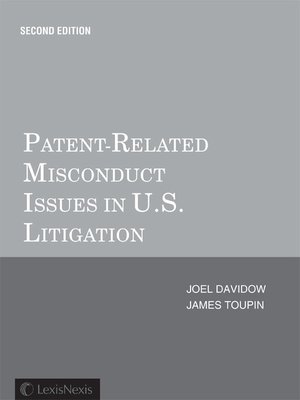
Sign up to save your library
With an OverDrive account, you can save your favorite libraries for at-a-glance information about availability. Find out more about OverDrive accounts.
Find this title in Libby, the library reading app by OverDrive.



Search for a digital library with this title
Title found at these libraries:
| Library Name | Distance |
|---|---|
| Loading... |
Patent Related Misconduct Issues in U.S. Litigation (Second Edition) by Joel Davidow and James Toupin is designed to serve as the first comprehensive review of conduct defenses and counterclaims, with a focus on existing case law and litigation strategies.
The Second Edition adds a co-author, James Toupin, former general counsel of the U.S. Patent and Trademark Office, and covers major developments in the field since 2008, including the Leahy-Smith America Invents Act, the adoption of a but-for test for inequitable conduct, and antitrust decisions relating to patent-pool abuse and pay-for-delay arrangements.
The first section of the book addresses claims involving misuse of the patenting process, with a focus on patents on a product or process the patentee did not invent as claimed and inequitable conduct claims, including intentional failure to cite material references and false or misleading declarations. From here the book turns to claims based on the misuse of the litigation process, including baseless and bad-purpose suits. The third and final section of the book describes claims based on the misuse of the competitive (antitrust) and licensing processes. Each section of the book is divided into sections devoted to law and strategy, with practical guidance related to handling document demands and other discovery requests, expert testimony and waiver issues.
This book is designed to provide patent litigators with a double arsenal of unprecedented case-law analysis and litigation strategy related to the "wild cards" of infringement cases: affirmative defenses and counterclaims based on assertions of patent-holder misconduct. Such claims can include:
misuse of the litigation process, including baseless and bad-purpose suits
In addition, each chapter of the book has a section devoted to litigation strategy related to a particular claim, with practical guidance on a range of issues including:
Features
Praise for the First Edition
"Davidow's treatment of inequitable conduct covers the basic elements of intent and materiality but also conveniently organizes the analysis according to both the underlying invalidity issues (e.g., best mode, prior sales) and the types of misconduct...







